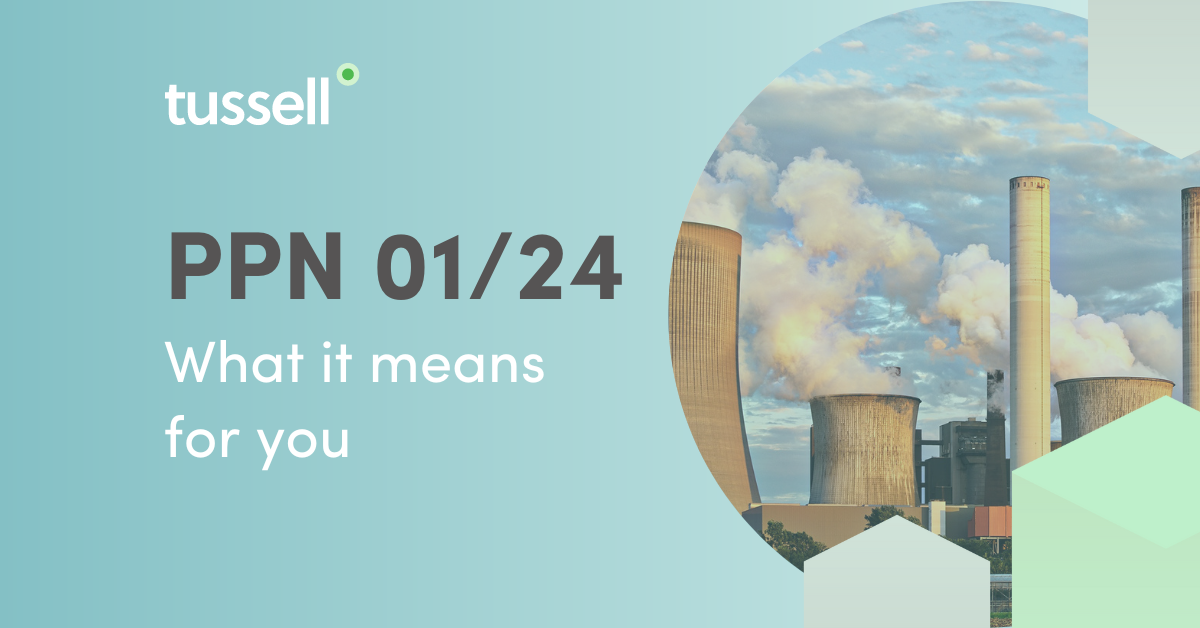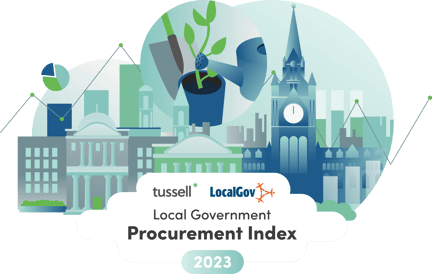This is an article about PPN 01/24: Carbon Reduction Schedules. To learn about PPN 001: SME and VCSE Spending Targets, click here.
* * *
In March 2024, the Cabinet Office published Procurement Policy Note (PPN) 01/24: Carbon Reduction Contract Schedule.
With the UK Government's net zero target set for 2050 (and even sooner in the devolved regions) PPN 01/24 empowers contracting authorities to demand fewer emissions from their suppliers without fear of retaliation or increased prices.
PPN 01/24 is the first procurement policy note to directly target carbon emissions since PPN 06/21, which required suppliers bidding on large contracts to publish a carbon reduction plan.
In this quick-fire blog, we summarise what changes PPN 01/24 introduces, and what it means for you.
💡 What changes does PPN 01/24 introduce?
PPN 01/24 introduces the Carbon Reduction Schedule. The Schedule empowers authorities to demand improvements in the environmental performance of their suppliers.
The Carbon Reduction Schedule is a tool that can used by contracting authorities when procuring a range of products and services, and should be applied proportionately and appropriately depending on the contract and category at hand.
The standard T&Cs in the Carbon Reduction Schedule provide a framework to monitor and assess a supplier’s decarbonisation performance through contract-specific emissions reporting, the setting of supplier greenhouse gas (GHG) emissions targets, and the monitoring and reduction of GHG emissions throughout the lifespan of a given contract.
These can be lifted directly from the document and added into supplier contracts.
The Carbon Reduction Schedule is split into the following sections:
-
Net Zero Obligation – this ensures the supplier's commitment to net-zero
-
Net Zero Commitment – this requires a supplier to create and maintain a Carbon Reduction Plan
-
Net Zero Contractual Commitments – these establish contractual commitments - eg. carbon reduction targets throughout the contract period
-
Reporting – this establishes the environmental reporting requirements throughout the length of the contract
-
Gain-share – this is an optional provision to help incentivise GHG emissions reductions over the contractual requirements
-
Net Zero Modification – this provides a mechanism to request modification to the contract during the contract term to support decarbonisation
-
Remediation Plan – this enables improvement requirements to be set in instances where targets are unlikely to be met
-
Fuel emissions – this established obligations to reduce fuel usage
-
Supply Chain Cascade - this optional clause enables relevant requirements to be cascaded down the supply chain
Several more optional and sector-specific clauses are also included at the bottom of the document.
🌱 How and when should the Carbon Reduction Schedule be applied?
Measuring the carbon emissions of specific contracts can be complex. For this reason, the Cabinet Office urges buyers to consider the following when assessing how to apply the Carbon Reduction Schedule in its procurement process:
- Category
-
Some categories generate higher greenhouse gas (GHG) emissions than others. Similarly, some categories will have a greater scope for improvement. FM, IT, professional services, construction, fleet and industrial service contracts, for example, tend to incur high levels of greenhouse gas emissions and are therefore suitable candidates for rigorous application of Carbon Reduction Schedules.
-
- Supply Chain and Readiness
-
While there is an opportunity to promote GHG emissions reduction by cascading requirements down the supply chain, this may also be a burden to SME and VCSE Suppliers. Buyers are therefore urged to apply such terms proportionately.
-
- Contract Value
-
It may not be appropriate to apply all the terms and conditions included in the carbon reduction schedule, especially when procuring low-value contracts. This is because low-value contracts are more likely to be delivered by SMEs and VCSE suppliers who may be less able to provide contract-specific greenhouse gas data.
-
The following questions may also be considered when deciding how to apply the tools afforded to authorities in PPN 01/24:
-
How much of an environmental impact can be made through this specific procurement? (taking into account all existing initiatives already being pursued)
-
To what extent does the implementation of decarbonisation intervention options rely on the main supplier(s) and what is the likelihood of supply chain adoption?
-
Are the key drivers for GHG Emissions intensity understood in detail, for instance are they linked to the type of activities which will be supplied?
-
Can the Authority support the main Supplier(s) to influence the supply chain through the T&Cs and encourage the adoption of incentivisation mechanisms linked to environmental sustainability? (e.g. through cascade responsibilities, supply chain transparency and effective oversight)
-
Is the supply chain length, complexity, readiness and/or Supplier size likely to be a barrier in terms of implementing decarbonisation interventions?
❓ Why is PPN 01/24 being introduced, and why should you use the Carbon Reduction Schedule?
The UK Government has committed to a policy of decarbonisation and a target of net-zero emissions by 2050.
PPN 01/24 allows buyers to more easily set carbon reduction targets for their suppliers, thereby tackling the climate crisis through public procurement. It also enables buyers to apply similar targets down their supply chain.
Conscious of how your procurement promotes social value?
See how your procurement with SMEs, VCSEs and local suppliers stack up with the Local Government Procurement Index
🔮 What next?
In-scope contracting authorities can begin to apply the Carbon Reduction Schedule immediately.
To read in more depth about how to implement provisions of the Schedule - and how to assess bidders against these new requirements - read the Cabinet Office's Guidance Document.
And, to uncover new ways of promoting social value through procurement, book a demo with the Tussell team.
*
To read the latest Procurement Policy Note for yourself, click here.
Behind on your PPN knowledge? Find all of our comprehensive PPN explainers below:
- PPN 10/23: Taking account of a bidder's approach to payment in the procurement of major contracts
- PPN 08/23: Using Standard Contracts
- PPN 07/23: Government Security Classifications Policy 2023
- PPN 05/23: Implementing new Free Trade Agreements
- PPN 01/23: Requirements to publish on Contracts Finder
- PPN 08/21: Taking account of a bidder's approach to payment in the procurement of major government contracts
- PPN 06/21: Taking account of Carbon Reduction Plans in the procurement of major government contracts
- PPN 05/21: National Procurement Policy Statement



%20v1.png)
![New Nav Bar - New Tag [Gov]](https://www.tussell.com/hubfs/New%20Nav%20Bar%20-%20New%20Tag%20%5BGov%5D.png)
![[Gov] New Nav CTA - Product, Frameworks Finder (rounded) v1](https://www.tussell.com/hubfs/%5BGov%5D%20New%20Nav%20CTA%20-%20Product%2c%20Frameworks%20Finder%20(rounded)%20v1.png)




![New Nav Bar, Insights - Strategic Suppliers 2025 [Gov] v2](https://www.tussell.com/hs-fs/hubfs/New%20Nav%20Bar%2c%20Insights%20-%20Strategic%20Suppliers%202025%20%5BGov%5D%20v2.png?width=600&height=600&name=New%20Nav%20Bar%2c%20Insights%20-%20Strategic%20Suppliers%202025%20%5BGov%5D%20v2.png)






.png?width=800&height=450&name=PPN%200224%20(1).png)